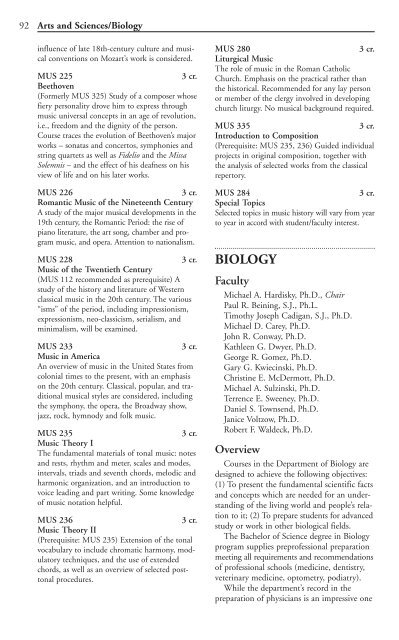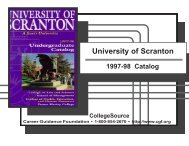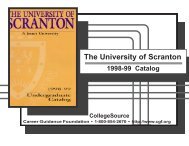2003-2004 - The University of Scranton
2003-2004 - The University of Scranton
2003-2004 - The University of Scranton
Create successful ePaper yourself
Turn your PDF publications into a flip-book with our unique Google optimized e-Paper software.
92 Arts and Sciences/Biology<br />
influence <strong>of</strong> late 18th-century culture and musical<br />
conventions on Mozart’s work is considered.<br />
MUS 225 3 cr.<br />
Beethoven<br />
(Formerly MUS 325) Study <strong>of</strong> a composer whose<br />
fiery personality drove him to express through<br />
music universal concepts in an age <strong>of</strong> revolution,<br />
i.e., freedom and the dignity <strong>of</strong> the person.<br />
Course traces the evolution <strong>of</strong> Beethoven’s major<br />
works – sonatas and concertos, symphonies and<br />
string quartets as well as Fidelio and the Missa<br />
Solemnis – and the effect <strong>of</strong> his deafness on his<br />
view <strong>of</strong> life and on his later works.<br />
MUS 226 3 cr.<br />
Romantic Music <strong>of</strong> the Nineteenth Century<br />
A study <strong>of</strong> the major musical developments in the<br />
19th century, the Romantic Period: the rise <strong>of</strong><br />
piano literature, the art song, chamber and program<br />
music, and opera. Attention to nationalism.<br />
MUS 228 3 cr.<br />
Music <strong>of</strong> the Twentieth Century<br />
(MUS 112 recommended as prerequisite) A<br />
study <strong>of</strong> the history and literature <strong>of</strong> Western<br />
classical music in the 20th century. <strong>The</strong> various<br />
“isms” <strong>of</strong> the period, including impressionism,<br />
expressionism, neo-classicism, serialism, and<br />
minimalism, will be examined.<br />
MUS 233 3 cr.<br />
Music in America<br />
An overview <strong>of</strong> music in the United States from<br />
colonial times to the present, with an emphasis<br />
on the 20th century. Classical, popular, and traditional<br />
musical styles are considered, including<br />
the symphony, the opera, the Broadway show,<br />
jazz, rock, hymnody and folk music.<br />
MUS 235 3 cr.<br />
Music <strong>The</strong>ory I<br />
<strong>The</strong> fundamental materials <strong>of</strong> tonal music: notes<br />
and rests, rhythm and meter, scales and modes,<br />
intervals, triads and seventh chords, melodic and<br />
harmonic organization, and an introduction to<br />
voice leading and part writing. Some knowledge<br />
<strong>of</strong> music notation helpful.<br />
MUS 236 3 cr.<br />
Music <strong>The</strong>ory II<br />
(Prerequisite: MUS 235) Extension <strong>of</strong> the tonal<br />
vocabulary to include chromatic harmony, modulatory<br />
techniques, and the use <strong>of</strong> extended<br />
chords, as well as an overview <strong>of</strong> selected posttonal<br />
procedures.<br />
MUS 280 3 cr.<br />
Liturgical Music<br />
<strong>The</strong> role <strong>of</strong> music in the Roman Catholic<br />
Church. Emphasis on the practical rather than<br />
the historical. Recommended for any lay person<br />
or member <strong>of</strong> the clergy involved in developing<br />
church liturgy. No musical background required.<br />
MUS 335 3 cr.<br />
Introduction to Composition<br />
(Prerequisite: MUS 235, 236) Guided individual<br />
projects in original composition, together with<br />
the analysis <strong>of</strong> selected works from the classical<br />
repertory.<br />
MUS 284 3 cr.<br />
Special Topics<br />
Selected topics in music history will vary from year<br />
to year in accord with student/faculty interest.<br />
BIOLOGY<br />
Faculty<br />
Michael A. Hardisky, Ph.D., Chair<br />
Paul R. Beining, S.J., Ph.L.<br />
Timothy Joseph Cadigan, S.J., Ph.D.<br />
Michael D. Carey, Ph.D.<br />
John R. Conway, Ph.D.<br />
Kathleen G. Dwyer, Ph.D.<br />
George R. Gomez, Ph.D.<br />
Gary G. Kwiecinski, Ph.D.<br />
Christine E. McDermott, Ph.D.<br />
Michael A. Sulzinski, Ph.D.<br />
Terrence E. Sweeney, Ph.D.<br />
Daniel S. Townsend, Ph.D.<br />
Janice Voltzow, Ph.D.<br />
Robert F. Waldeck, Ph.D.<br />
Overview<br />
Courses in the Department <strong>of</strong> Biology are<br />
designed to achieve the following objectives:<br />
(1) To present the fundamental scientific facts<br />
and concepts which are needed for an understanding<br />
<strong>of</strong> the living world and people’s relation<br />
to it; (2) To prepare students for advanced<br />
study or work in other biological fields.<br />
<strong>The</strong> Bachelor <strong>of</strong> Science degree in Biology<br />
program supplies prepr<strong>of</strong>essional preparation<br />
meeting all requirements and recommendations<br />
<strong>of</strong> pr<strong>of</strong>essional schools (medicine, dentistry,<br />
veterinary medicine, optometry, podiatry).<br />
While the department’s record in the<br />
preparation <strong>of</strong> physicians is an impressive one
















